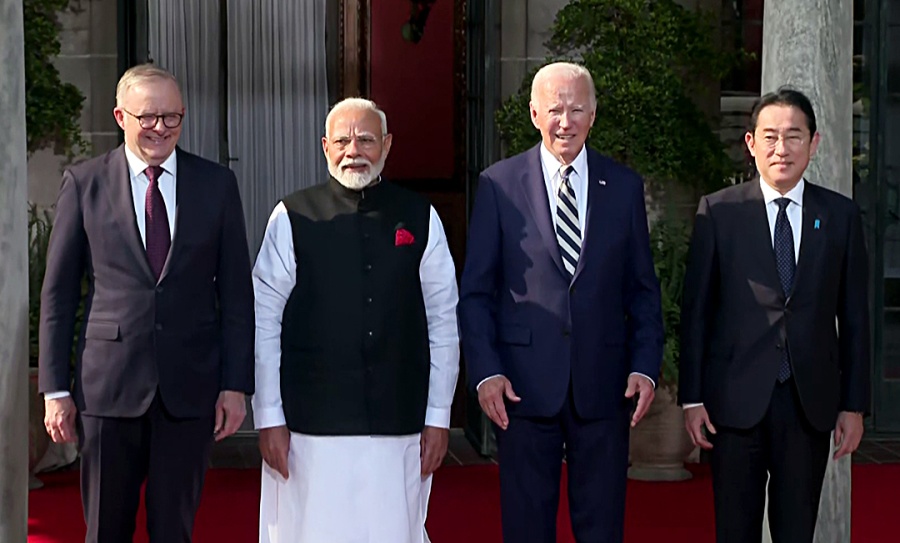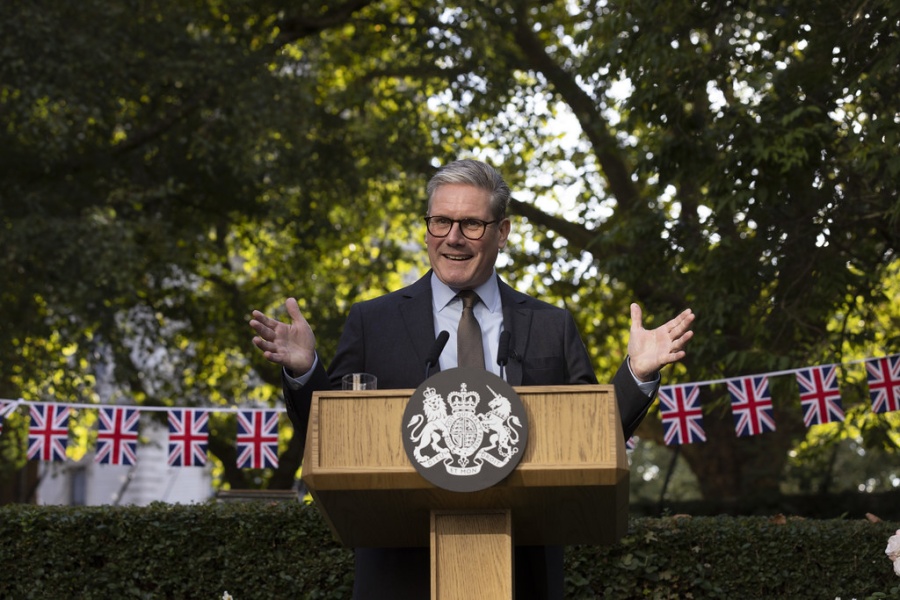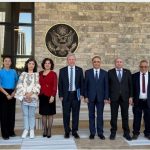Joint declaration opposes efforts to disrupt other countries’ offshore resource exploitation activities, and reaffirm that maritime disputes must be resolved peacefully and in accordance with international law…reports Asian Lite News
India’s Prime Minister Narendra Modi, US President Joe Biden, Prime Minister of Australia, Anthony Albanese, and Japan Prime Minister Fumio Kishida on Saturday met for the 4th in-person Quad Leaders’ Summit in Wilmington, Delaware, and expressed serious concern about the coercive and intimidating manoeuvres in the South China Sea.
In the joint declaration, the leaders from the US, India, Australia, and Japan opposed efforts to disrupt other countries’ offshore resource exploitation activities, and reaffirm that maritime disputes must be resolved peacefully and in accordance with international law.
“We are seriously concerned about the situation in the East and South China Seas. We continue to express our serious concern about the militarisation of disputed features, and coercive and intimidating manoeuvres in the South China Sea. We condemn the dangerous use of coast guard and maritime militia vessels, including the increasing use of dangerous manoeuvres. We also oppose efforts to disrupt other countries’ offshore resource exploitation activities.We reaffirm that maritime disputes must be resolved peacefully and in accordance with international law, as reflected in UNCLOS,” the Quad Wilmington Declaration said.
The leaders asserted that they are of strong conviction that international law, including respect for sovereignty and territorial integrity, along with the maintenance of peace, safety, security, and stability in the maritime domain, should be kept at the topmost priority.
“We emphasize the importance of adherence to international law, particularly as reflected in the United Nations Convention on the Law of the Sea (UNCLOS), to address challenges to the global maritime rules-based order, including with respect to maritime claims,” the declaration read.
“We re-emphasize the universal and unified character of UNCLOS and reaffirm that UNCLOS sets out the legal framework within which all activities in the oceans and the seas must be carried out. We underscore that the 2016 Arbitral Award on the South China Sea is a significant milestone and the basis for peacefully resolving disputes between the parties,” it further added.
The Quad leaders added that they recommit to working in partnership with Pacific island countries to achieve shared aspirations and address shared challenges.
“We remain committed to strengthening cooperation in the Indian Ocean region. We strongly support IORA as the Indian Ocean region’s premier forum for addressing the region’s challenges. We recognize India’s leadership in finalizing the IORA Outlook on the Indo-Pacific (IOIP) and express our support for its implementation. We thank Sri Lanka for its continued leadership as IORA Chair through this year and look forward to India’s assuming the IORA Chair in 2025,” the declaration said.
The Quad Foreign Ministers Meeting joint statement issued on July 29 this year said that the countries of the bloc were collectively advancing a positive and practical agenda to support the Indo-Pacific region’s sustainable development, stability, and prosperity, responding to the region’s needs.
Amid China’s coercive pressure on Taiwan in the wake of the Lai Ching-te winning the presidential polls of the self-governed island and following tensions between China and the Philippines, the Quad foreign ministers had previously said they were “seriously concerned about the situation in the East and South China Seas” and reiterated their “strong opposition to any unilateral actions that seek to change the status quo by force or coercion.”
Taiwan has been governed independently since 1949. However, China considers Taiwan part of its territory and insists on eventual reunification, by force if necessary.
Meanwhile, Biden and Australian Prime Minister Anthony Albanese, during their bilateral meeting, expressed concerns over China’s “coercive and destabilising activities” in the Indo-Pacific region. The two leaders held talks on the sidelines of the Quad Leaders’ Summit 2024 in Wilmington, Delaware, on Saturday (local time).
“The leaders discussed their respective diplomacy with the People’s Republic of China (PRC) and their shared concerns about the PRC’s coercive and destabilising activities, including in the South China Sea,” the White House statement read.
During their meeting, both leaders emphasised their country’s progress in strengthening bilateral ties since PM Albanese’s official visit to Washington, DC, back in October 2023.
Both leaders held talks on their support for maintaining peace and stability in the Taiwan Strait and their continued assistance to Ukraine. They also discussed their support for a sustainable ceasefire and increased humanitarian aid to the people of Gaza.
Biden and Albanese underscored that the US-Australia Alliance remains the “core of the bilateral relationship” and welcomed the “depth of cooperation across its three pillars,” which are “defence and security,” “economic,” and “climate and clean energy.”
Notably, the leaders reaffirmed their shared commitment to the Australia-United Kingdom-United States (AUKUS) Joint Leaders Statement to advance their “trilateral partnership and promote a free and open Indo-Pacific that is secure and stable.”
Biden further welcomed Albanese’s contributions to the Quad and its growing partnership with Japan, as well as their active engagement in the Pacific region.
The leaders also reflected on the strength of their “economic relationship” and further discussed the progress over the past two years to modernise the Alliance in the face of new challenges, including addressing climate change and the clean energy transition.
The leaders also committed to continuing their bilateral partnership to advance their shared vision for a free and open Indo-Pacific. (ANI)
ALSO READ: China mulls national military training for children, college students














